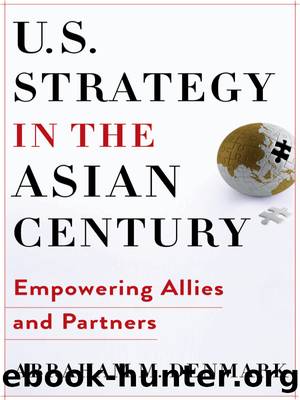U.S. Strategy in the Asian Century by Abraham M. Denmark

Author:Abraham M. Denmark
Language: eng
Format: epub
Tags: POL011010, Political Science/International Relations/Diplomacy, POL054000, Political Science/World/Asian
Publisher: Columbia University Press
Published: 2020-08-18T00:00:00+00:00
COMPETING WITH CHINA POLITICALLY
Australia has been on the frontline of confronting the realities of Chinese interference in its domestic politics and intellectual life. Most notably, former Australian Labor Party senator Sam Dastyari became embroiled in a campaign finance scandal that highlighted Australiaâs lax political finance laws and ultimately ended his promising political career. Reports emerged that Dastyari had accepted political donations from Chinese billionaire Huang Xiangmo around the same time that Dastyariâs public stance began to soften toward Chinaâtoward positions contrary to the Liberal Party government and the Labor Party.20 The Australian Security Intelligence Organisation recently stated that foreign governments have been acting within ethnic civic societies and religious organizations that were âdesigned to diminish their criticism of foreign government.â It went on to further state, in its annual report, that âthese activitiesâ¦represent a threat to our sovereignty, the integrity of our national institutions and the exercise of our citizensâ rights.21 Additionally, Canberra and Washington have been concerned by Beijingâs deepening influence with the Pacific island nations, primarily achieved through infrastructure building and the promise of loans.22 Australia has become weary of Beijingâs encroaching interests in the South Pacific, specifically the proposed Chinese military outpost in Vanuatu.23
Washington and Canberra should identify opportunities to share information and coordinate policies designed to understand and mitigate Beijingâs efforts to influence their respective domestic politics. They should consider establishing an active and robust intelligence exchange working group dedicated to monitoring, assessing, and producing recommendations to mitigate the activities of the United Front Work Department of the Chinese Communist Party and other organizations that seek to influence the domestic politics of Australia and the United States. This working group would develop recommendations for legislators and policymakers in Washington and Canberra, and would produce an annual public report detailing its findings and recommendations.
Additionally, the United States and Australia should work to closely coordinate diplomatic and policy initiatives that would assist in a broader geopolitical competition with China across the Indo-Pacific, primarily by sustaining openness and liberalism across the region. From the United Nations and other international forums, common values and interests should enable cooperation and coordination on a wide variety of diplomatic issues, including continuing efforts to isolate and maximize pressure on North Korea, defending norms related to freedom of navigation and the peaceful resolution of disputes, and consolidating democratization across the Indo-Pacific.
Download
This site does not store any files on its server. We only index and link to content provided by other sites. Please contact the content providers to delete copyright contents if any and email us, we'll remove relevant links or contents immediately.
What's Done in Darkness by Kayla Perrin(25500)
Shot Through the Heart: DI Grace Fisher 2 by Isabelle Grey(18219)
Shot Through the Heart by Mercy Celeste(18160)
The Fifty Shades Trilogy & Grey by E L James(17774)
The 3rd Cycle of the Betrayed Series Collection: Extremely Controversial Historical Thrillers (Betrayed Series Boxed set) by McCray Carolyn(13189)
The Subtle Art of Not Giving a F*ck by Mark Manson(12912)
Scorched Earth by Nick Kyme(11832)
Stepbrother Stories 2 - 21 Taboo Story Collection (Brother Sister Stepbrother Stepsister Taboo Pseudo Incest Family Virgin Creampie Pregnant Forced Pregnancy Breeding) by Roxi Harding(11040)
Drei Generationen auf dem Jakobsweg by Stein Pia(10217)
Suna by Ziefle Pia(10186)
Scythe by Neal Shusterman(9259)
International Relations from the Global South; Worlds of Difference; First Edition by Arlene B. Tickner & Karen Smith(8608)
Successful Proposal Strategies for Small Businesses: Using Knowledge Management ot Win Govenment, Private Sector, and International Contracts 3rd Edition by Robert Frey(8419)
This is Going to Hurt by Adam Kay(7695)
Dirty Filthy Fix: A Fixed Trilogy Novella by Laurelin Paige(6453)
He Loves Me...KNOT by RC Boldt(5804)
How to Make Love to a Negro Without Getting Tired by Dany LaFerrière(5378)
Interdimensional Brothel by F4U(5304)
Thankful For Her by Alexa Riley(5161)
